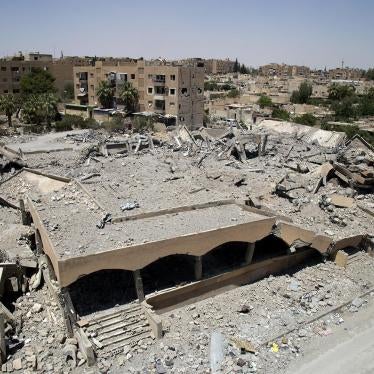(New York) – Tunisia ratified the international treaty banning cluster munitions on September 28, 2010, becoming the first country in the Middle East and North Africa to do so. The move should encourage others from the region to ratify or accede to the treaty, Human Rights Watch said.
“Tunisia has taken the lead in the region by ratifying this crucial humanitarian agreement,” said Sarah Leah Whitson, Middle East and North Africa director at Human Rights Watch. “This should inspire Iraq and Lebanon, the only other two countries in the region to have signed the treaty, to complete ratification. It is a signal to other governments across the region that now is the time to join the ban.”
A total of 108 countries have signed the 2008 Convention on Cluster Munitions, which was opened for signature in December 2008. Tunisia is the 42nd among countries that signed the treaty to ratify the convention, which prohibits the use, production, transfer, and stockpiling of cluster munitions. The convention entered into force on August 1, and its first formal meeting of states parties will be in Vientiane, Laos on November 9 through 12. Since it entered into force, states may no longer sign, but must accede, which is essentially a one-step process equivalent to signature and ratification.
“Civilians in several Middle Eastern countries have suffered terribly from the destruction caused by cluster munitions,” Whitson said. “The more governments join the ban, the less likely these weapons will cause further harm.”
Cluster munitions have been used in more than 30 countries since the end of World War II, including in Iraq, Lebanon, Kuwait, Israel, Saudi Arabia, Syria, Libya and in the territory of Western Sahara, causing ongoing devastation and loss even long after the conflicts that led to their use have ended.
Israel, Egypt, and Iran also have produced cluster munitions, and Israel and Egypt have exported them. At least 14 countries from the region are believed to stockpile cluster munitions, including Algeria, Bahrain, Egypt, Iran, Israel, Jordan, Kuwait, Libya, Morocco, Oman, Qatar, Saudi Arabia, United Arab Emirates, and Yemen.
Tunisia was the first country from North Africa to sign the convention, on January 12, 2009. Tunisia is not believed to have used, produced, stockpiled, or transferred cluster munitions.
The Convention on Cluster Munitions represents a major advance in protecting civilians both during and after armed conflict, Human Rights Watch said. In addition to banning cluster munitions, it requires the clearance of affected areas within 10 years and destruction of stockpiled weapons within eight years, and includes provisions to help affected nations with clearance and victim assistance.








